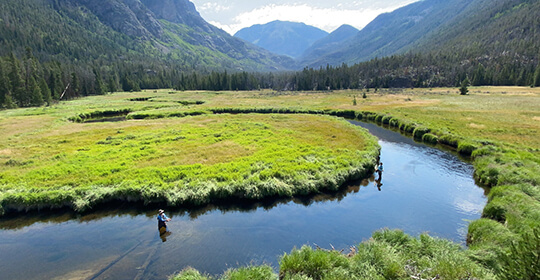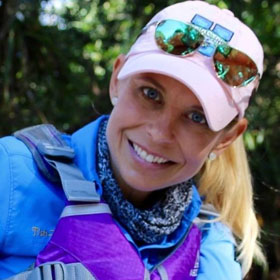6 Tips for Planning a Colorado High Mountain Lakes Fishing Trip
By Debbie Hanson
May 20, 2024
List of tips to help plan a Colorado high mountain lakes fishing trip this spring, how to prepare to catch brook trout, cutthroat trout on fly in alpine lakes
Colorado is a favorite destination for fly anglers due in part to the number of pristine high mountain lakes that offer opportunities to target species like cutthroat trout and brook trout in waters that experience very little fishing pressure. However, planning a Colorado high mountain lakes fishing trip requires careful preparation due to the remote nature of these types of experiences. Before giving you some tips, it might help to know that a high mountain lake is defined as a lake that sits at or above 10,000 feet in elevation.
Now that you know what the definition of a high mountain lake is, check out these six tips to plan a Rocky Mountain fly fishing trip this spring.
1. Research the Lakes
Before scheduling your trip, research the high mountain lakes in Colorado that are known for their excellent fly fishing opportunities. Websites (search for “spring fly fishing Colorado”), travel guidebooks, and local fly shops are valuable resources for information on lake locations, species of fish to target, and accessibility. Consider factors such as elevation, level of hiking difficulty, and amount of fishing pressure to choose the best lakes given your preferences and level of fly fishing experience.
2. Pack Appropriately
Packing the right supplies is a crucial part of a safe and successful fly fishing trip in the high mountains of Colorado. Bring lightweight and breathable clothing for variable weather conditions, including rain gear and warm layers for chilly mornings and evenings. Essential fishing gear includes a fly rod, reel, fly line, flies, leaders, tippet, and a landing net. Don’t forget to pack sunscreen, insect repellent, bear spray, a first aid kit, plenty of water, and high-energy snacks (such as trail mix with fruit and nuts) to stay hydrated and fueled during your high mountain adventure.
3. Check Fishing Regulations
Familiarize yourself with Colorado fishing regulations, including licensing requirements, catch limits, and special regulations for high mountain lakes. Purchase your fishing license as well as any required permits before your trip. Follow all regulations to protect the fishery and to preserve the pristine beauty of these remote lakes for future generations.

4. Work on Fly Fishing Skills
Fly fishing in high mountain lakes is a unique fishing experience that requires certain skill sets. This may include casting in windy conditions, navigating rocky terrain, and identifying feeding patterns of trout at high elevations. Work on fly casting techniques, learn how to read the water, and research fly patterns before your trip. Consider taking a casting lesson or hiring a guide to boost your chances of success on the water – this will be particularly helpful if you have limited time and want to make the most of your trip.
5. Be Prepared for Higher Altitudes
Educate yourself on high altitude fishing challenges, including decreased oxygen levels, rapid weather changes, and higher susceptibility to dehydration. Take the appropriate steps to acclimate to the altitude gradually by staying hydrated, avoiding strenuous activity for the first few days of your trip, and paying close attention to any symptoms of altitude sickness (such as nausea or shortness of breath). Be sure to have a handheld GPS and a personal locator beacon or satellite communication device along in case of an emergency (cell phone service can be spotty or nonexistent in remote alpine lake areas).
6. Respect the Environment
When fishing in Colorado’s high mountain lakes, practice the “Leave No Trace” principles to preserve the natural beauty of these pristine wilderness areas. Pack out your trash and dispose of any waste properly. Avoid trampling fragile vegetation and be mindful of the wildlife by keeping a safe distance (never feed or disturb wild animals).
Now you know how research the best high mountain lakes, make a list of gear and supplies, check the fishing regulations in advance, prepare for higher altitudes, work on your fly fishing skills, and leave no trace in the natural environment, So, grab your fly rod and get ready for spring fly fishing in Colorado.









